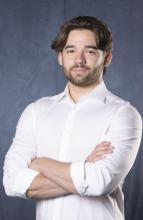
I am a first year Mechanical Engineering Ph.D. student studying Artificial Intelligence applications to Tribology in Dr. Q. Jane Wang's lab at Northwestern University. I was previously involved in modeling stress-dependent oxidation growth under Dr. Theirry Blanchet during my time as an undergrad at Rensselaer Polytechnic Institute. Tribology is the study of the phenomena related to interfacing surfaces. A historically illusive and frustrating area of tribology is the prediction of wear simply because wear occurs everywhere and takes on a variety of different forms. The goal of my research is to develop a Mechanics-based, AI-enabled Theorization Engine for Wear (MAThEW). The novel system, MAThEW, will be built upon the existing literature of wear data, material phenomena, and latest contact mechanics software to develop equations that describe wear in user-defined applications. MAThEW presents a novel direction of tribological research that will have applications in failure analyses, advancing Tribology into the next paradigm of data-driven research, and reducing the complexity of wear phenomena.
What benefits of your fellowship do you most anticipate or have you enjoyed the most? I anticipate the greatest benefit of fellowship funding is the increased agency over the direction of my research. Rather than needing my Principal Investigator to secure funding for me that may come with strings attached or a specified direction of research, I am free to explore new areas of research with no push back from the university.
What is your vision for your future; what do you expect to be doing after your fellowship? After completing my Ph.D., I want to transition to industry. My experience as a graduate student will leave me prepared to help engineering companies harness the power of data and AI methodologies to innovate and improve upon their products. The new age of AI-powered technologies has the ability to revolutionize all industries, and I want to play a critical role in encouraging companies to embrace this new paradigm.
What advice do you give to current students considering applying to programs? When applying for fellowships, be memorable. Reviewers want to see creativity, inspiration, leadership, and scientific curiosity. Be specific, and articulate your goals, but more importantly, demonstrate an ability to learn from your fellowship experience regardless of success or failure. At the end of the day, the reviewers are looking to make an investment, and it is your job as the applicant to convince them that you have the greatest potential for scientific discovery, community impact, and leadership in an interdisciplinary world. Remember that an application is no time for modesty.
